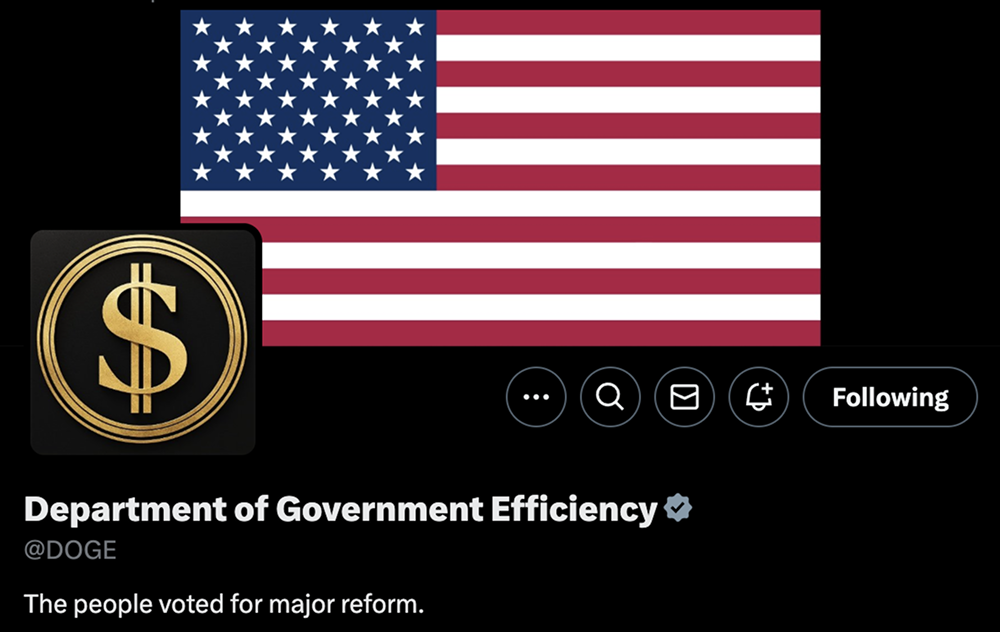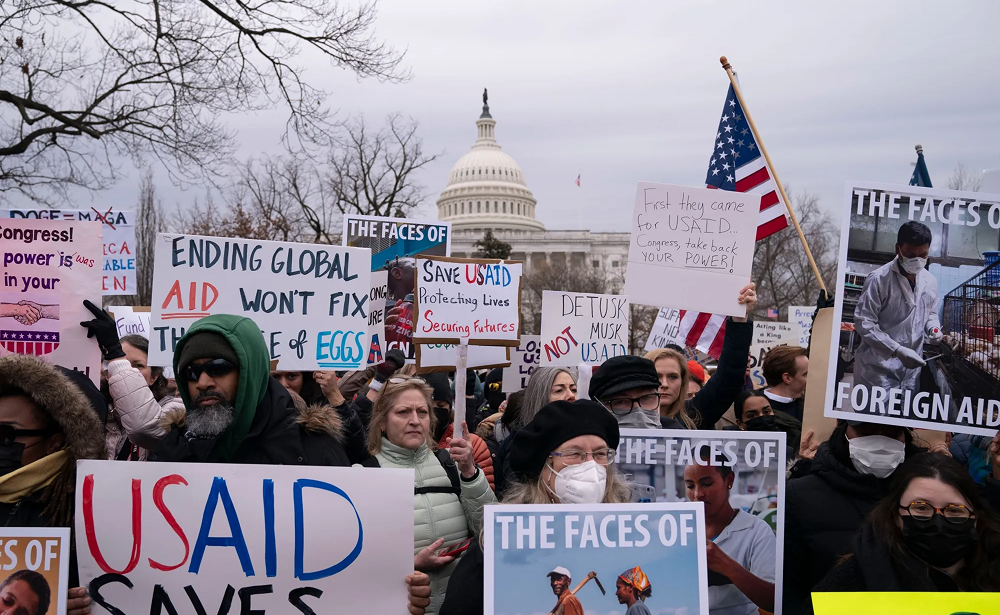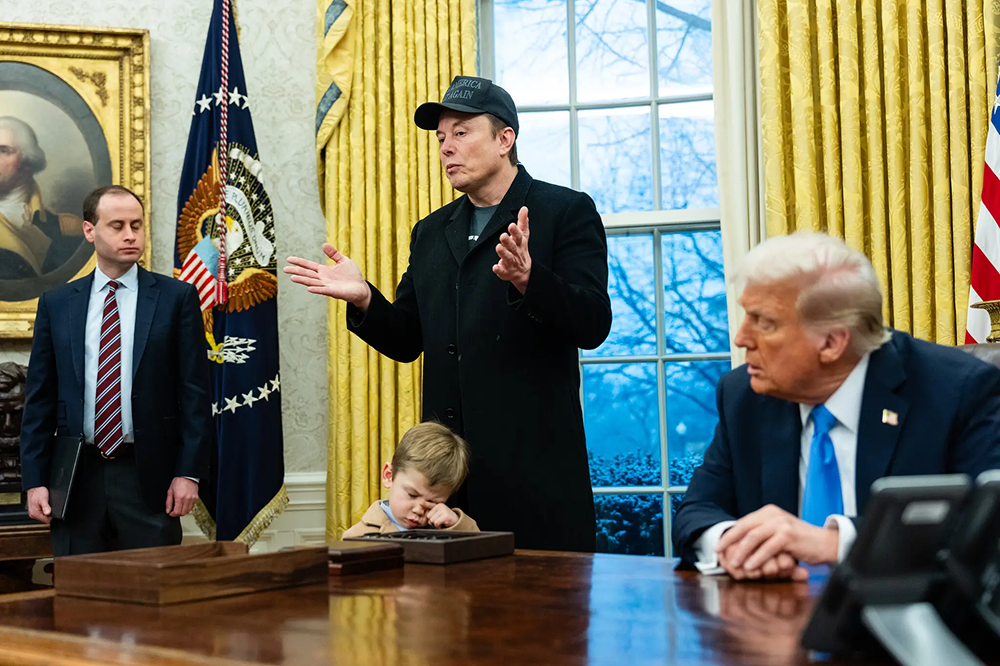With the strong support of President Trump, tech leader Elon Musk officially took charge of the newly established "Department of Government Efficiency" (DOGE), aimed at reshaping the bloated government agencies, enhancing administrative efficiency, and significantly cutting unnecessary financial expenditures. Just three weeks after its establishment, DOGE launched a series of reform measures with great momentum, quickly igniting debates in the legal and political arenas.
Inauguration of the Department of Government Efficiency (DOGE)
Authorized by the Trump administration, DOGE made a high-profile debut in February and entered operational status at an astonishing speed. Its official website went live on February 13, publicly revealing the organizational structure and regulatory framework of the U.S. government, and previewing detailed cost-cutting plans and performance assessment reports to be released in the near future. The establishment of DOGE is widely seen as an important signal of the U.S. government's commitment to reform, heralding the arrival of an era focused on enhancing administrative efficiency and optimizing financial expenditures.
Musk emphatically stated at a press conference: "The inefficiency of the U.S. government has become a chronic issue, and we can no longer tolerate a large and inefficient bureaucratic system that continues to consume national resources. We must undertake bold reforms, decisively cut waste, and ensure that every taxpayer dollar is spent wisely."

Core Measures to Cut Government Spending
From the outset, DOGE decisively implemented several fiscal austerity policies, directly targeting the pain points of the federal government:
1. Halting the Leasing of Vacant Office Buildings
DOGE instructed the General Services Administration (GSA) to immediately terminate leasing contracts for vacant office buildings across the country. As of February 2, 22 federal leasing contracts had been unilaterally canceled, expected to save approximately $44.6 million. Musk candidly pointed out that these long-vacant office buildings "serve no purpose and waste valuable financial resources." DOGE's goal is to "eliminate all meaningless expenditures."
2. Terminating Multiple Government Contracts
DOGE conducted a comprehensive and rigorous review of government spending projects and boldly terminated hundreds of contracts, particularly those related to diversity, equity, and inclusion (DEI) initiatives, media subscription services, and consulting agreements. Musk firmly stated that these projects failed to demonstrate clear public benefit, and DOGE would prioritize cutting those government expenditures that are "questionable in value and exorbitant in cost."
3. Closing the U.S. Agency for International Development (USAID)
Most notably, DOGE unexpectedly announced the closure of the U.S. Agency for International Development (USAID) without any prior warning. The reason given was the agency's "corruption and inefficiency." USAID has long been responsible for providing aid to developing countries but has also been mired in controversy. This closure has sparked strong reactions globally, with some countries accusing the U.S. of "undermining global leadership," while others believe it will help reduce waste in foreign aid and focus limited resources on domestic development issues.

Escalating Legal and Political Controversies
DOGE's hardline reform measures have created significant waves in the legal and political fields, akin to a boulder thrown into calm waters.
14 States Unite to File a Lawsuit
Attorneys General from 14 U.S. states have joined forces to challenge DOGE legally, openly questioning the boundaries of its authority, arguing that the president should not delegate such significant fiscal decision-making power to an individual who is neither elected nor approved by the Senate. Some legal experts sharply pointed out that DOGE's rapid expansion may have violated the Constitution and bypassed normal legislative oversight procedures.
Congressional Hearings Focus on Fiscal Reform
The House Government Efficiency Subcommittee has urgently convened its first hearing, where bipartisan lawmakers engaged in heated debates over DOGE's series of measures. Republican lawmakers emphasized that the U.S. national debt has surpassed $36 trillion, making fiscal reform imperative; while Democrats vehemently criticized Musk's approach as "too extreme," arguing that his blunt cuts to government spending could cause irreparable damage to the social public service system.
Musk: Without Spending Cuts, the U.S. Faces "Bankruptcy" Risk
In a recent meeting with President Trump at the White House, Musk once again engaged in in-depth discussions with the president regarding fiscal reform. He firmly stated: "If decisive measures to cut government spending are not taken, the U.S. will slide into fiscal bankruptcy in the coming years." He emphasized that DOGE's mission is not only to cut waste but also to "reshape the government governance model" and build a self-sustaining fiscal management system.
Moreover, Musk publicly committed that DOGE's operations will adhere to "maximum transparency," promising to regularly release specific data on cost reductions to allow for public oversight and demonstrate the actual effectiveness of the reforms.

Calls for Auditing the Federal Reserve Resurface
Meanwhile, calls for auditing the Federal Reserve have surged again. This week, discussions on social media platform X about "Ron Paul leading the audit of the Federal Reserve and even being nominated as its chairman" have become rampant. Notably, this proposal received brief but strong support from Elon Musk himself—"Good idea!" Musk's statement undoubtedly intensified speculation about whether this administration will push for reforms in the Federal Reserve's transparency. The Federal Reserve has long maintained a high degree of independence to avoid excessive political interference in monetary policy. However, proposals to audit the Federal Reserve have consistently faced strong opposition in Washington.
Analysts have pointed out that increasing scrutiny of the Federal Reserve could undermine market confidence in the dollar and accelerate capital shifts toward alternative assets like Bitcoin and gold. Cryptocurrency derivatives trader Gordon Grant warned in a media interview, "Ron Paul's deep exposure of the Federal Reserve may trigger widespread questioning among American individual investors regarding the stability of dollar assets. The confrontation between Paul and the Federal Reserve could catalyze a market shift toward tangible, spendable real-world assets, such as seamless POS transactions using tokenized gold that can be instantly exchanged for fiat currency, or Bitcoin as a reliable alternative asset. This scenario is likely to mark the beginning of the dollar's 'Minsky moment.'" The term "Minsky moment" in finance is often used to describe the eve of a market crash—when investors collectively realize the inherent fragility of the financial system, market confidence can collapse in an instant, leading to panic selling, liquidity crises, and systemic financial risks.
Market Linkage Between DOGE and Dogecoin
An interesting phenomenon is that the English abbreviation of DOGE coincidentally matches the widely popular cryptocurrency "Dogecoin." Following the launch of the DOGE official website and the intensive release of related reform news, the price of Dogecoin surged by 13% in a short period. Although there is currently no evidence to suggest a direct connection between the DOGE government department and Dogecoin, the market generally believes that Elon Musk's powerful personal influence remains a significant factor driving short-term price fluctuations of Dogecoin.

Future Outlook
Under Elon Musk's leadership, the reform journey of DOGE is just beginning, but its series of bold measures have already sparked widespread and profound impacts in the political and social spheres. In the coming months, the policy direction of DOGE, the outcomes of its legal challenges, and the actual effectiveness of government spending cuts will directly relate to the ultimate fate of this new agency.
Regardless of the final outcome, the emergence of DOGE marks yet another bold attempt at reforming the governance model of the U.S. government. Against the backdrop of rising global fiscal deficits, whether this reform can truly enhance administrative efficiency and effectively reduce waste will ultimately require time to provide an answer.
Disclaimer: The above content does not constitute investment advice.
AiCoin Official Website: www.aicoin.com
Telegram: t.me/aicoincn
Twitter: x.com/AiCoinzh
Email: support@aicoin.com
Group Chat: Customer Service Yingying、Customer Service KK
免责声明:本文章仅代表作者个人观点,不代表本平台的立场和观点。本文章仅供信息分享,不构成对任何人的任何投资建议。用户与作者之间的任何争议,与本平台无关。如网页中刊载的文章或图片涉及侵权,请提供相关的权利证明和身份证明发送邮件到support@aicoin.com,本平台相关工作人员将会进行核查。



